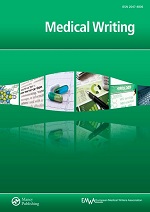
Volume 23, Issue 2 - Regulatory Writing Basics
Good clinical practice (GCP): A universal call for ethics in biomedical research
Author: Gabriele Berghammer
Abstract
Today, the principles of good clinical practice (GCP) form such an integral part of the development of new medicines that they could easily be taken for granted. Yet, the road to a universal code of ethics in human experimentation is paved with tragedies which have only gradually led to tightened rules on human experimentation. Awareness of the historical roots of GCP helps explain that GCP, rather than representing a seemingly endless series of regulations, finally provides an international ethical and scientific quality standard designed to protect the rights and safety of individuals consenting to participate in clinical trials and to ensure the integrity and credibility of clinical research data. For medical writers, familiarity with the principles of GCP, which in the European Union are now a legal obligation, is an essential prerequisite for providing documentation in compliance with the ethical and scientific principles of GCP: not only are medical writers expected to frame clinical research into a language that enables independent assessors to evaluate the methodological validity of a study and the safety and efficacy of a given drug, they also compose documents that may be instrumental in assuring the rights and safety of clinical trial participants.
 Download the full article
Download the full article
References
- Vollmann J, Winau R. Informed consent in human experimentation before the Nuremberg code. BMJ 1996;313:1445–7.
- Grodin MA. Historical origins of the Nuremberg Code. In: Annas GJ, Grodin MA editors. The Nazi doctors and the Nuremberg Code: human rights in human experimentation. Oxford, UK: Oxford University Press; 1992. p. 121–44.
- United States Holocaust Memorial Museum, Washington, DC [updated 2013 Jun 10; cited 2014 Feb 11]. Available from: http://www.ushmm.org/wlc/en/article.php?ModuleId=10005168
- Office for Human Research Protections (OHRP). The Nuremberg Code. In: Trials of war criminals before the Nuremberg military tribunals under Control Council Law No. 10. Washington, DC: Government Printing Office, 1949, vol. 2, p. 181–2 [cited 2014 Feb 11]. Available from: http://www.hhs.gov/ohrp/archive/nurcode.html
- World Medical Association. History [cited 2014 Feb 11]. Available from: http://www.wma.net/en/60about/70history/index.html
- The Thalidomide Trust. The Story of Thalidomide [cited 2014 Feb 8]. Available from: http://www.thalidomidetrust.org/story
- Bren L. Frances Oldham Kelsey: FDA medical reviewer leaves her mark on history. FDA Consumer Magazine March–April 2001 [cited 2014 Feb 9]. Available from: http://permanent.access.gpo.gov/lps1609/www.fda.gov/fdac/features/2001/201_kelsey.html
- Florence L. Is thalidomice to blame? Lancet 1960;31:1954.
- Kalte F. Der Spiegel 1961;50:p89 [cited 10 Feb 2014]. Available from: http://www.spiegel.de/spiegel/print/d-32576654.html
- Verband Forschender Arzneimittelhersteller (vfa). Aus der Contergan-Katastrophe gelernt [published 2007 Nov 2; cited 2014 Feb 9]. Available from: http://www.vfa.de/de/arzneimittel-forschung/artikel-arzneimittel-forschung/teratogenitaet.html
- World Medical Association. WMA Declaration of Helsinki – Ethical Principles for Medical Research Involving Human Subjects [cited 2014 Feb 11]. Available from: http://www.wma.net/en/30publications/10policies/b3/
- World Health Organization. Handbook for good clinical research practice (GCP). Guidance for Implementation, 2002.
- World Health Organization. Guidelines for good clinical practice (GCP) for trials on pharmaceutical products. WHO Technical Report Series 1995;850.
- International Conference on Harmonisation of Technical Requirements for Registration of Pharmaceuticals for Human Use (ICH). Efficacy Guidelines. Good Clinical Practice E6 [cited 2014 Feb 10]. Available from: http://www.ich.org/products/guidelines/efficacy/article/efficacy-guidelines.html
- European Commission. Medical Devices – Clinical Investigation and Evaluation, International standard EN ISO 14155:2011 [cited 2014 Feb 11]. Available from: http://ec.europa.eu/health/medical-devices/dialogue-parties/working-groups/cie_wg_index_en.htm
- International Conference on Harmonisation of Technical Requirements for Registration of Pharmaceuticals for Human Use (ICH) [cited 2014 Feb 11]. Available from: http://www.ich.org/
- International Conference on Harmonisation of Technical Requirements for Registration of Pharmaceuticals for Human Use (ICH). Process of Harmonisation [cited 2014 Feb 11]. Available from: http://www.ich.org/about/process-of-harmonisation/formalproc.html
- Poolman RW, Hanson B, Marti RK, Bhandari M. Conducting a clinical study: a guide for good research practice. Indian J Orthop 2007;41:27–31.
- Joos S, Bleidorn J, Haasenritter J, Hummers-Pradier E, Peter-Klimm F, Gagyor I, et al. Ein Leitfaden zur Planung Nichtmedikamentöser klinischer Studien in der Primärversorgung unter Berücksichtigung der Kriterien der Guten Klinischen Praxis (GCP) [Manual for the design of non-drug trials in primary care, taking account of Good Clinical Practice (GCP) criteria] Zeitschrift für Evidenz. Fortbild Qualitätssich Gesundheitswesen 2013;107:87–92
- Claudon M, Dietrich CF, Choi BI, Cosgrove DO, Kudo M, Nolsoe CP, et al. Guidelines and good clinical practice recommendations for contrast enhanced ultrasound (CEUS) in the liver – update 2012. Ultraschall Med 2013;34:11–29.
- European Commission. Medicinal Product for Human Use – Revision of the Clinical Trials Directive [cited 2014 Feb 12]. Available from: http://ec.europa.eu/health/human-use/clinical-trials/index_en.htm#rlctd
- European Commission. Medicinal Product for Human Use – Revision of the Clinical Trials Directive. Proposal for a Regulation of the European Parliament and of the Council on clinical trials on medicinal products for human use, and repealing Directive 2001/20/EC [cited 2014 Feb 12]. Available from: http://ec.europa.eu/health/human-use/clinical-trials/index_en.htm#rlctd
Search
Articles
Links
Editoral Board
Editor-in-Chief
Co-Editors
Managing Editor
Victoria White
Associate Editors
Section Editors
AI/Automation
Biotechnology
Digital Communication
EMWA News
Gained in Translation
Getting Your Foot in the Door
Good Writing Practice
In the Bookstores
Publications
Medical Communications/Writing for Patients
Medical Devices
My First Medical Writing
News from the EMA
Freelancing
Pharmacovigilance
Regulatory Matters
Regulatory Public Disclosure
Teaching Medical Writing
Louisa Ludwig-Begall / Sarah Kabani
The Crofter: Sustainable Communications
Veterinary Writing
Editors Emeritus
Layout Designer
Chris Monk
 Visit the EMWA website
Visit the EMWA website